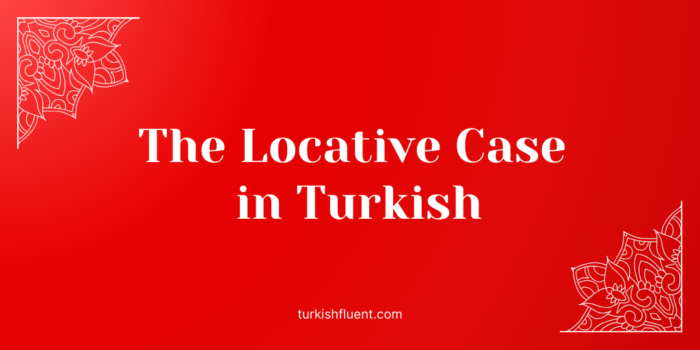The locative case in Turkish is used to indicate location. It corresponds to the English prepositions “at,” “in,” and “on.” This case is formed by adding -da, -de, -ta, or -te to a noun, depending on vowel harmony and consonant rules.
How to Form the Locative Case
The locative suffix changes based on vowel harmony and consonant harmony:
Noun + da/de
| Last Vowel in the Word | Suffix |
|---|---|
| a, ı, o, u | -da |
| e, i, ö, ü | -de |
If the noun ends in a voiceless consonant (f, s, t, k, ç, ş, h, p), the d in the suffix changes to t:
Noun (ending with ç, f, h, k, p, s, ş or t) + ta/te
Examples:
| Noun | Locative Case | Meaning |
| ev (house) | evde | at home |
| okul (school) | okulda | at school |
| park (park) | parkta | in the park |
| kütüphane (library) | kütüphanede | in the library |
| şehir (city) | şehirde | in the city |
| Ankara (Ankara) | Ankara’da | in Ankara |
| Türkiye (Turkey) | Türkiye’de | in Turkey |
Adding Personal Endings to the Locative Case
Noun + da/de/ta/te + (y) + (personal ending)
The locative case can be combined with personal suffixes to indicate “I am at,” “you are at,” etc.
| Personal Pronoun | Personal Ending | Example (Ev – Home) | Meaning |
| Ben (I) | -yim/-yım/-yüm/-yum | Evdeyim | I am at home |
| Sen (You) | -sin/-sın/-sün/-sun | Evdesin | You are at home |
| O (He/She/It) | – | Evde | He/She/It is at home |
| Biz (We) | -yiz/-yız/-yüz/-yuz | Evdeyiz | We are at home |
| Siz (You – plural/formal) | -siniz/-sınız/-sünüz/-sunuz | Evdesiniz | You are at home |
| Onlar (They) | -ler/-lar (optional) | Evdeler / Evde | They are at home |
Example of Questions and Answers with the Locative Case
To ask “Where are you?” in Turkish, use Neredesin? Here are some practical examples:
- Neredesin?(Where are you?)
- Evdeyim. (I am at home.)
- Nerede çalışıyorsun?(Where do you work?)
- Ofiste çalışıyorum. (I work at the office.)
- Ali nerede?(Where is Ali?)
- Ali parkta. (Ali is in the park.)
- Nerede oturuyorsunuz?(Where do you live? – formal/plural)
- İstanbul’da oturuyoruz. (We live in Istanbul.)
- Öğrenciler nerede?(Where are the students?)
- Öğrenciler sınıfta. (The students are in the classroom.)
When to Use an Apostrophe (‘)
In Turkish, proper nouns (such as city, country, and personal names) take an apostrophe before the locative suffix:
- Fransa’da (In France)
- Türkiye’de (In Turkey)
- Mehmet’te (At Mehmet’s place)
For regular nouns, the suffix is added directly:
- Evde (At home)
- Okulda (At school)
- Parkta (In the park)
Usage of the Locative Case
The locative case is used in different contexts, including:
a) Indicating Location
The most common use is to express where something is.
- Kitap masada. (The book is on the table.)
- Otel Ankara’da. (The hotel is in Ankara.)
- Ali bahçede. (Ali is in the garden.)
- Kışın Türkiye’deyim. (I am in Turkey in winter.)
b) Time Expressions
The locative case is sometimes used for time expressions, similar to “in” or “at” in English.
- Sabah erkende buradaydım. (I was here early in the morning.)
- Ocakta tatildeyiz. (We are on vacation in January.)
c) “At” in Fixed Phrases
Some phrases naturally use the locative case to mean “at.”
- Hastanede yattı. (He stayed at the hospital.)
- Markette çalışıyor. (She works at the market.)
- Tiyatroda güzel bir oyun izledik. (We watched a nice play at the theater.)
The locative case in Turkish is simple and easy to use, yet incredibly useful. Now that you understand its rules, discover how to form the accusative case in Turkish.
